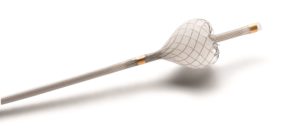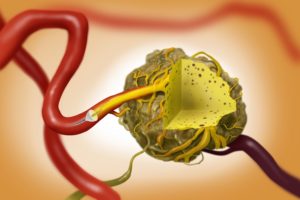
TriSalus Life Sciences (“TriSalus”, formerly Surefire Medical) today announced the launch of its TriNav infusion system (“TriNav”). Powered by its proprietary pressure-enabled drug delivery (PEDD) approach with SmartValve technology, TriNav is designed to help overcome the infusion barriers that limit therapeutic uptake in solid tumours, including hepatocellular carcinoma (HCC) and liver metastases.
The TriNav system can provide interventional radiologists intravascular tumour access with improved trackability, compatibility with standard angiographic catheters, and workflow comparable to standard interventions, a TriSalus press release states.
The tumour microenvironment creates pressure barriers that limit flow into solid tumors. PEDD with SmartValve creates a high-pressure gradient that improves delivery and penetration of therapy into tumours. The porous expandable SmartValve is designed to allow antegrade flow, and leverages blood flow to carry the dose deep into the solid tumour. SmartValve enables therapy delivery to the intended target while minimising non-target delivery that has been shown to damage healthy tissue.
In a clinical study, PEDD with SmartValve demonstrated the ability to overcome tumour infusion barriers and significantly improve response rates in HCC. Outcomes from a retrospective, single-centre study of patients with solitary HCC tumors who underwent treatment utilising either PEDD or standard end-hole microcatheters, showed 100% objective response (OR) with PEDD versus 76.5% with standard end-hole microcatheters (p=0.019). Additionally, after first treatment, Pathological response (PR) as shown by tumour necrosis percentage was significantly greater with PEDD (88.8%) versus standard end-hole microcatheters (33.8%; p=0.026). Improving response rates could potentially help more patients meet transplant criteria, lead to successful down-staging, bridging, and post-transplant survival.
“Tumour-directed delivery of therapeutics is an exciting opportunity to help improve outcomes across a wider range of procedures by overcoming intratumoral pressure that can prevent drugs from adequately penetrating the tumour,” says Mary Szela, president and CEO of TriSalus. “The new TriNav infusion system utilises SmartValve, a first-in-kind, proprietary technology that has been shown to modulate pressure and flow with the goal for improved therapeutic delivery and deeper penetration into the tumour while helping to protect healthy tissue.”

Acknowledging its technology for therapeutic delivery, the Centers for Medicare and Medicaid Services (CMS) granted TriNav transitional pass-through payment as part of the 2020 Medicare Hospital Outpatient Prospective Payment System and Ambulatory Surgical Center Payment System (CMS-1717-FC), effective 1 January, 2020.
This supplemental payment is intended to “facilitate access for [Medicare] beneficiaries to the advantages of new and innovative devices”. The TriNav infusion system met the required criteria to receive transitional pass-through status, including the demonstration of substantial clinical improvement, with the CMS saying it believes there is no existing pass-through payment category for this device because its SmartValve technology offers a unique mechanism for therapy delivery to selected sites in the peripheral vascular system, including solid tumours in the liver.










